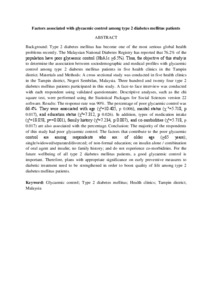Citation
W. H., Wan Farzana Fasya and Juni, Muhamad Hanafiah and Md Said, Salmiah and Ariffin, Ahmad Azuhairi and A. Rahman, Zairina
(2016)
Factors associated with glycaemic control among type 2 diabetes mellitus patients.
International Journal of Public Health and Clinical Sciences, 3 (3).
pp. 89-102.
ISSN 2289-7577
Abstract
Background: Type 2 diabetes mellitus has become one of the most serious global health problems recently. The Malaysian National Diabetes Registry has reported that 76.2% of the population have poor glycaemic control (HbA1c ≥6.5%). Thus, the objective of this study is to determine the association between sociodemographic and medical profiles with glycaemic control among type 2 diabetes mellitus patients in five health clinics in the Tampin district. Materials and Methods: A cross sectional study was conducted in five health clinics in the Tampin district, Negeri Sembilan, Malaysia. Three hundred and twenty four type 2 diabetes mellitus patients participated in this study. A face-to face interview was conducted with each respondent using validated questionnaire. Descriptive analyses, such as the chi square test, were performed using the Statistical Packages for Social Sciences version 22 software. Results: The response rate was 90%. The percentage of poor glycaemic control was 66.4%. They were associated with age (χ²=10.405, p 0.006), marital status (χ ²=5.718, p 0.017), and education status (χ²=7.312, p 0.026). In addition, types of medication intake (χ²=18.058, p=<0.001), family history (χ²=7.234, p 0.007), and co-morbidities (χ²=5.718, p 0.017) are also associated with the percentage. Conclusion: The majority of the respondents of this study had poor glycaemic control. The factors that contribute to the poor glycaemic control are among respondents who are: of older age (≥65 years); single/widowed/separated/divorced; of non-formal education; on insulin alone / combination of oral agent and insulin; no family history; and do not experience co-morbidities. For the future wellbeing of all type 2 diabetes mellitus patients, a good glycaemic control is important. Therefore, plans with appropriate significance on early preventive measures to diabetic treatment need to be strengthened in order to boost quality of life among type 2 diabetes mellitus patients.
Download File
![[img]](http://psasir.upm.edu.my/54276/1.hassmallThumbnailVersion/Factors%20associated%20with%20glycaemic%20control%20among%20type%202%20diabetes%20mellitus%20patients.pdf)  Preview |
|
Text
Factors associated with glycaemic control among type 2 diabetes mellitus patients.pdf
Download (111kB)
| Preview
|
|
Additional Metadata
Actions (login required)
 |
View Item |

